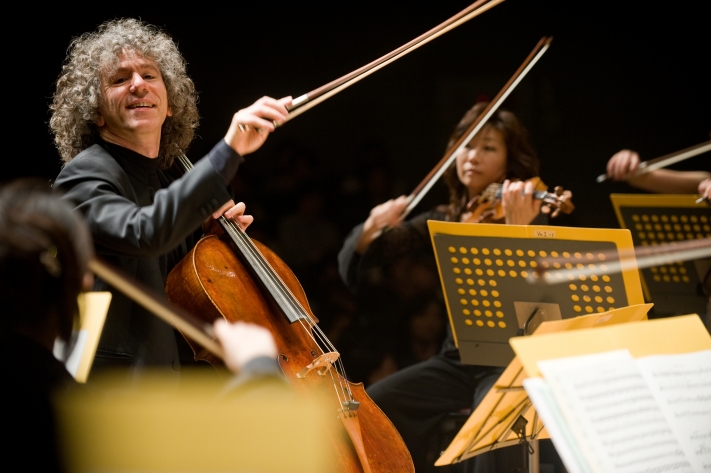Saturday's Oxford Philharmonic concert at the Sheldonian on this day of sold-out public events in Windsor and at Wembley was a notable sell-out of its own, Dvorák and Elgar replacing Windsor's glorious Ode for the Birthday of Queen Anne from G. F. Handel. Was it the appeal of Steven Isserlis of whom it's often said that he's the foremost cellist in Britain today? Or the perennial enthusiasm for two of the most popular works in the repertoire? Probably something of both, and the advent of the full-on tourist season is, of course, helpful. Seated around me in our eyrie in the Upper Gallery were a group from Madrid, two young people from Seoul, S. Korea, and a couple from San Antonio, Texas.
First up came Steven Isserlis with his rendering of Elgar's Cello Concerto, instantly recognizable by a British public but less so on the continent of Europe where Elgar hardly enjoys the prominence accorded to him in his native land. Isserlis has a remarkable musical pedigree. His grandfather moved to Vienna in 1922, and, looking for accommodation, was turned away by a 102-year-old prospective landlady on the grounds that she wanted no unruly musician in her house, her aunt having once suffered from a musical tenant who was noisy and used to spit on the floor; by name Ludwig van Beethoven!
The concerto was written by 1919, and the
tone of this post-World War I composition, Elgar's last completed orchestral
score, is reticent and introverted. Nevertheless, the famous declamatory
passage for the cello that begins it should be arresting, putting down a marker
of firm intensity. The Isserlis interpretation here and throughout was low-key,
however, with the solo cello striving somewhat to project itself above the
orchestra sound, at least to the ears of those of us in the Upper Gallery. I
think this may be because gut strings, rather than modern steel ones, are the
preferred choice of Isserlis on his 1726 Stradivarius instrument, and they
necessarily lack the carrying power of their present-day counterparts.
In the second movement, the orchestral part is minimal for the most part, and Marios Papadopoulos relaxed visibly as the cello turned to a moto perpetuo style of playing. In the finale, we briefly occupied the mood of Pomp and Circumstance before the cellist introduced a more lyrical theme. Here Isserlis picked up the volume as he joined the crisp march tune leading to the brief coda.
For an encore, we heard the solo piece Song of the Birds, an old Catalan folk song, here arranged by Sally Beamish. Again a quiet, pensive piece, very much in the mould of the work that had preceded it. At the end Isserlis held up his cello, and pointing to it; seemed to say almost disingenuously: 'Twas the instrument that did it!'.
After the interval we heard Dvorák's New World Symphony from 1893, with its
unmistakable preoccupation with the outdoors, perfect for a balmy evening. Conductor
Marios Papadopoulos established a certain pastorality with a little cakewalk
motif in the cellos, and then this is heard again a little later as a jiggish
figure, taken quite quickly.
The famous big tune of the 'largo' was taken smoothly by the cor anglais, the tenor member of the oboe family, of Daniel Finney – he was the first musician to be singled out for applause at the end – and then in the 'scherzo' came a theme borrowed extensively by the studio composer for many a western movie. Did Glenn Ford await with trepidation the arrival of The 3.10 to Yuma with this ringing in his ears? Did John Wayne set out to this in pursuit of Natalie Wood in The Searchers? Certainly Maestro Papadopoulos was up for the chase, almost defying gravity as he leaned out from his podium, dragging the last drops of energy from the syncopated strings. The whole brass section was in fine form, and the French horn theme near the start of the finale was powerfully handled. At the very end, the wind chord diminished in volume all the way down to pianississimo.




